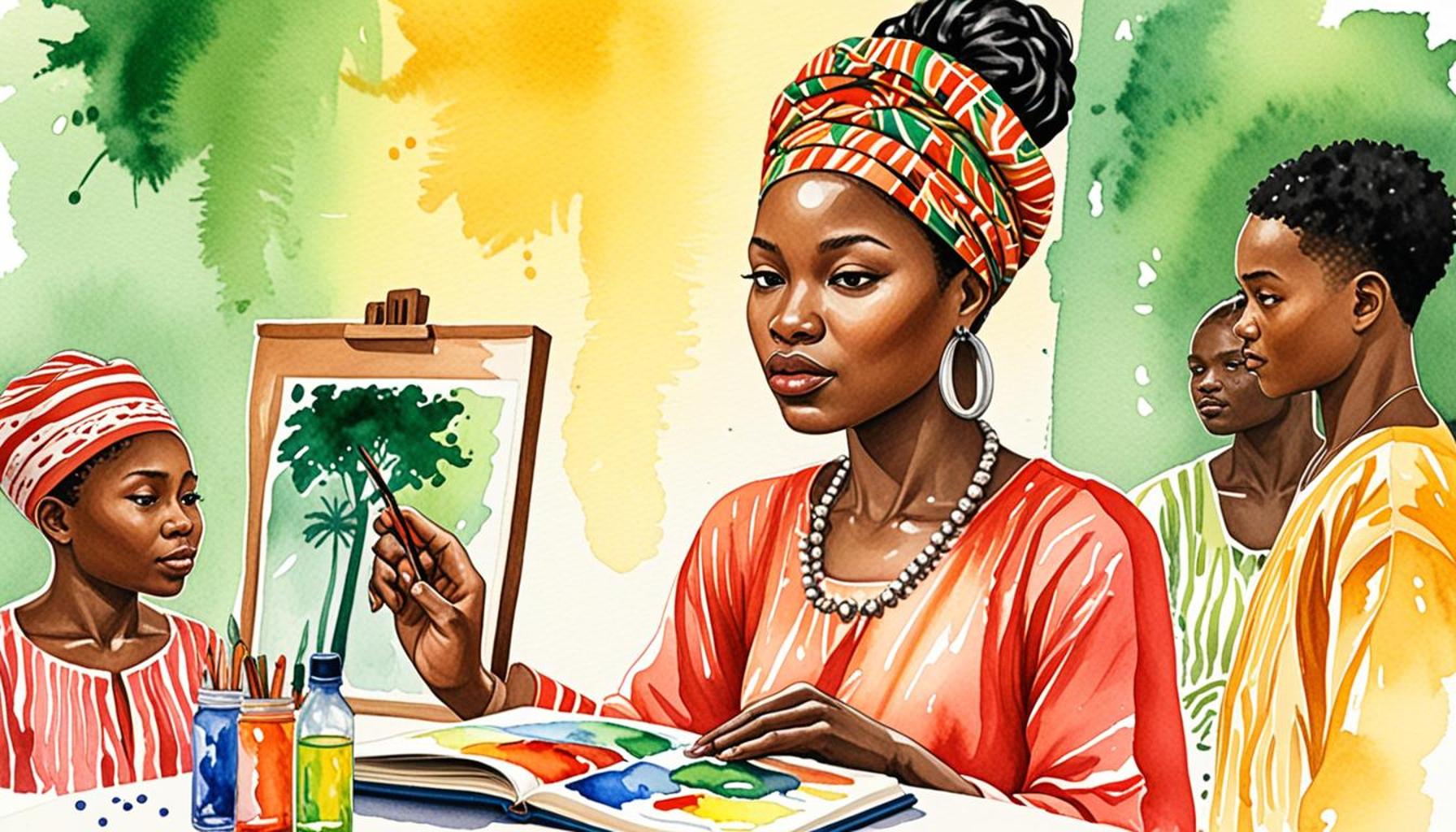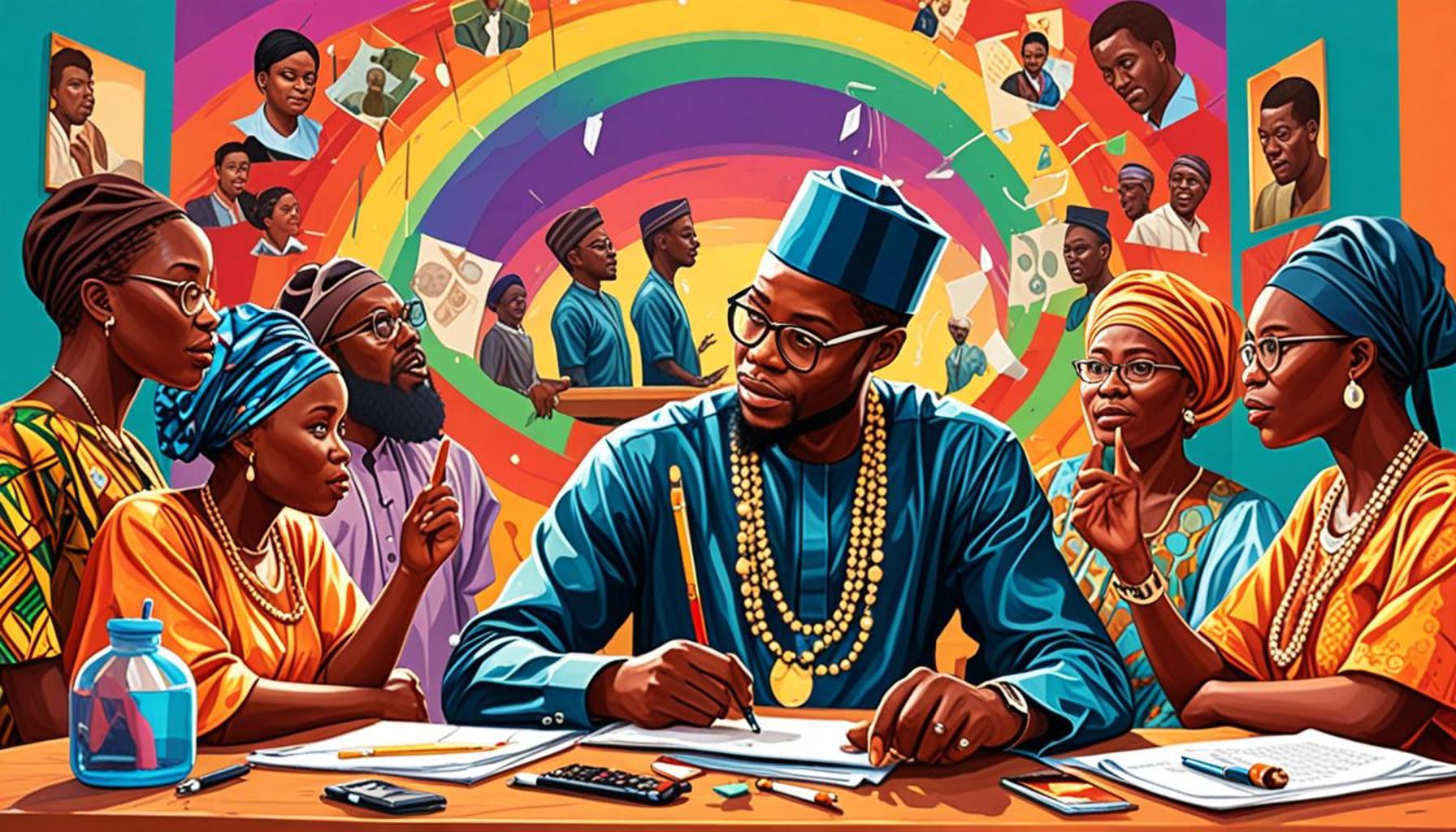How Self-Reflection Can Enhance Empathy in Nigerian Multicultural Environments

Understanding the Importance of Empathy in Nigeria’s Diverse Society
Nigeria stands as a vibrant tapestry of cultures, with over 250 ethnic groups each contributing their unique voices and traditions. Amidst this rich diversity, the need for understanding and mutual respect among different cultural backgrounds is vital. Empathy acts as the thread that weaves these diverse strands into a cohesive narrative, fostering cooperation and harmony within communities.
The Role of Self-Reflection in Cultivating Empathy
One of the most effective methods for nurturing empathy is through self-reflection. This intentional practice encourages individuals to delve into their own thoughts, feelings, and belief systems, thereby creating a fertile ground for personal growth and understanding. By engaging in self-reflection, individuals can:
- Become aware of personal biases, which may stem from upbringing or societal norms. For instance, recognizing prejudices against certain ethnicities can pave the way for more open-minded interactions.
- Understand the perspectives of others through active listening and engagement, which can lead to more meaningful relationships and fewer conflicts.
- Recognize shared experiences among diverse cultures, such as celebrations or challenges, creating a sense of unity in diversity.
In the context of Nigeria, balancing traditional practices with modern influences presents unique opportunities for self-reflection. For instance, a Yoruba individual attending an Igbo wedding may initially feel out of place, but through self-reflection, they could appreciate the underlying values of community and togetherness that both cultures celebrate.
Challenging Stereotypes and Appreciating Differences
Through self-reflection, individuals can also:
- Identify cultural assumptions that often lead to misconceptions. Acknowledging these assumptions is the first step towards breaking down barriers.
- Challenge stereotypes that restrict understanding, such as the portrayal of certain ethnic groups in the media. It is essential to seek first-hand experiences that paint a more nuanced picture.
- Appreciate different worldviews which enrich our societal fabric. Engaging with stories and histories from various ethnic groups can create a more profound respect for their experiences.
By fostering an environment where self-reflection and empathy thrive, individuals contribute significantly to the vision of a more inclusive and understanding society. This journey toward enhancing empathy not only nurtures personal development but also fortifies the multicultural fabric of Nigeria, allowing it to flourish.
In conclusion, empathy and self-reflection are not merely individual practices; they are societal imperatives. As Nigerians strive to coexist harmoniously, embracing these tools offers a pathway to a more cohesive future, one where diversity is celebrated and differences are seen as opportunities for growth and enrichment.
ADDITIONAL INSIGHTS: Expand your understanding here
The Catalyst of Self-Reflection in Building Bridges
In a nation as diverse as Nigeria, characterized by an intricate blend of languages, customs, and beliefs, the concept of self-reflection emerges as a vital tool for promoting empathy. This introspective practice invites individuals to examine their identities, question their perceptions, and assess their interactions with others. Ultimately, self-reflection serves as a catalyst for bridging cultural divides and fostering a sense of community among Nigeria’s various ethnic groups.
Deepening Cultural Understanding through Introspection
For Nigerians navigating multicultural environments, self-reflection encourages a deeper understanding of one’s cultural identity and values. By engaging in thought-provoking questions like “What does my culture mean to me?” or “How do my experiences shape my views on other cultures?”, individuals can uncover the essence of their ethnic backgrounds. This understanding can lead to a more profound appreciation of the rich tapestries that constitute the nation, allowing for a more empathetic approach to interpersonal relationships.
Consider the example of a Hausa individual attending a traditional Igbo festival. Initially, they may find the customs unfamiliar and even daunting. However, through self-reflection, they can recognize the universal themes of celebration, resilience, and heritage that permeate both cultures. This realization promotes not only personal growth but also a connection to others, paving the way for shared experiences that transcend ethnic boundaries.
Enhancing Empathy through Shared Narratives
Empathy flourishes when individuals can relate to the stories of others. Self-reflection enables Nigerians to explore their own life stories and recognize parallels with those from disparate cultural backgrounds. This exploration reveals how experiences such as love, loss, joy, and hardship transcend ethnic lines, fostering a greater appreciation for the humanity that binds everyone together.
To fully harness self-reflection in enhancing empathy, individuals can:
- Engage in dialogues with people from different ethnic backgrounds to challenge preconceived notions and build understanding.
- Reflect on past interactions to identify moments of misunderstanding or conflict, analyzing what could have been done differently to promote harmony.
- Participate in community events that celebrate diverse cultures, offering opportunities to connect with others and expand one’s worldview.
Engaging in these practices not only helps to dismantle prejudices but also nurtures a more inclusive environment where empathy leads to collective action and collaboration among Nigeria’s multicultural population. By investing in the practice of self-reflection, we as Nigerians can work towards a society that values understanding and unity, reinforcing the narrative of coexistence in our beautiful nation.
Understanding the Role of Self-Reflection in Developing Empathy
Self-reflection is a transformative process that encourages individuals to engage in deep personal assessment. In the context of Nigerian multicultural environments, where diverse ethnicities and traditions converge, the ability to practice self-reflection becomes crucial. It allows individuals to examine their biases, motivations, and emotional responses, creating a pathway toward enhanced empathy. When people reflect on their interactions with others, they are better positioned to relate to the experiences and emotions of those from different cultural backgrounds. This understanding is particularly vital in Nigeria, where historical, social, and economic disparities can create tensions among communities. By recognizing these differences, individuals can cultivate a more profound appreciation for each other’s experiences.A study conducted by social psychologists highlighted that engaging in self-reflection leads to an increase in emotional intelligence—a critical factor in empathic behavior. As Nigerian society embraces its multicultural composition, self-reflection emerges as a tool for fostering dialogue and understanding among differing groups. By prioritizing self-reflection, individuals can also combat stereotypes and preconceived notions about different ethnic groups. This process encourages open-mindedness, allowing varied perspectives to enrich one’s understanding of society. In multicultural settings like Nigeria, where connections among diverse groups are essential for coexistence, elevating the practice of self-reflection can lead to more profound empathetic relationships, ultimately promoting peace and unity across cultural divides.
Table of Advantages of Self-Reflection
| Category | Advantages |
|---|---|
| Increased Emotional Awareness | Self-reflection helps individuals identify and understand their emotions, crucial for better empathy. |
| Reduction of Bias | Engaging in self-reflection can help dismantle stereotypes, promoting more authentic connections. |
| Enhanced Communication Skills | Reflective practices enhance active listening and articulate responses, fostering healthier dialogues. |
| Cultivation of Open-Mindedness | Self-reflection encourages appreciating diverse cultures and experiences, integral to Nigerian society. |
CHECK OUT: Click here to explore more
Creating Collaborative Spaces through Self-Reflection
Self-reflection not only fosters empathy on an individual level but also acts as a powerful mechanism for creating collaborative spaces among diverse groups in Nigeria. In multicultural environments, where differences can lead to misunderstandings, self-reflective practices can encourage a culture of dialogue and cooperation. When individuals take the time to introspect, they become more aware of their biases and are prompted to reconsider their assumptions about others.
Transforming Conflicts into Opportunities for Growth
In a vibrant society like Nigeria, where tribalism and ethnic conflicts have periodically disrupted harmony, self-reflection can be instrumental in transforming potential conflicts into educational opportunities. Nigerians who engage in self-reflection are more likely to approach disputes with a mindset geared toward understanding rather than judgment. For instance, during community meetings where various ethnicities are represented, a person who has taken the time to reflect on their cultural standpoint might be more receptive to hearing an opposing view. They can then facilitate a conversation that values each voice equally, reducing the chance of heated debates.
Empirical studies suggest that self-reflective practices can enhance emotional regulation, allowing individuals to manage their reactions in stressful situations better. For example, a Yoruba individual feeling resentment towards a perceived slight from a Fulani counterpart might pause and reflect on the broader context of their interaction. By doing so, they might realize that the comments were not personal attacks but rather an expression of cultural communication styles. Such realizations can significantly transform relationships, providing a pathway to stronger alliances through shared understanding.
Connecting Through Collective Reflection
Communities can also benefit from collective self-reflection initiatives, such as workshops or discussion forums aimed at exploring cultural narratives. These gatherings allow participants to share their stories in a safe space, ultimately deepening mutual empathy. In regions where interethnic relations have been strained, the act of sharing personal experiences can weave narratives that unite rather than divide. It is pivotal for community leaders to facilitate these conversations, as their guidance can help create an atmosphere of trust and support that encourages openness.
Additionally, educational institutions across Nigeria can incorporate self-reflection into the curricula to cultivate empathy from a young age. For instance, reflective journaling assignments that require students to explore their cultural backgrounds and understand their peers’ histories can provide foundational skills in empathy. Not only does this dual approach help students comprehend their cultural identities, but it also promotes active listening and respect for others, thereby fostering a more empathetic generation.
- Encourage community-led workshops focused on shared experiences that illuminate cultural similarities and differences.
- Utilize educational settings to introduce frameworks for self-reflection among students of various backgrounds.
- Promote conflict resolution strategies that incorporate self-reflection as a means of developing understanding and empathy.
By creating environments that prioritize self-reflection, Nigerians can cultivate a culture of empathy that is sustainable and transformative. In doing so, they contribute to a narrative that celebrates diversity and unity, proving that in the heart of multicultural Nigeria, understanding each other is not just beneficial—it is essential. Through this practice, individuals can strengthen their communities, fostering a spirit of collaboration that is grounded in shared humanity.
LEARN MORE: This related article may interest you
Conclusion
In the complex tapestry of Nigeria’s multicultural environments, the role of self-reflection emerges as a crucial element in enhancing empathy among diverse groups. This introspective practice not only allows individuals to confront their inherent biases but also paves the way for deeper understanding and connectivity with others, transcending tribal and ethnic divides. As we navigate the challenges that come with our rich cultural mosaic, we must recognize that self-reflection serves as a transformative tool, turning potential conflicts into opportunities for growth and learning.
Nurturing self-reflection does not solely rely on personal efforts; rather, it calls for a collective commitment from communities, educators, and leaders alike. Initiatives aimed at facilitating shared stories and experiences can cultivate a culture of empathy, forging alliances between various ethnic groups and creating spaces for honest dialogue. Moreover, integrating reflective practices into educational settings ensures that future generations acquire the skills necessary to appreciate and embrace diversity from an early age.
As Nigerians, when we invest in developing our emotional intelligence through self-reflection, we are not merely seeking personal growth; we are actively contributing to a more inclusive society. The journey towards empathy requires continuous effort, but the rewards—strengthened communities and enhanced social cohesion—are immeasurable. It is imperative for each of us to embark on this journey, creating a harmonious coexistence that honors the rich diversity inherent in our nation. In the end, understanding each other is not just a noble pursuit; in Nigeria, it is a necessity for a brighter, unified future.


